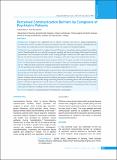Please use this identifier to cite or link to this item:
https://hdl.handle.net/20.500.14356/2296Full metadata record
| DC Field | Value | Language |
|---|---|---|
| dc.contributor.author | Khatri, Sushila | - |
| dc.contributor.author | Samson, Priscilla | - |
| dc.date.accessioned | 2023-07-30T10:54:52Z | - |
| dc.date.available | 2023-07-30T10:54:52Z | - |
| dc.date.issued | 2022 | - |
| dc.identifier.citation | KhatriS., & SamsonP. (2023). Perceived Communication Barriers by Caregivers of Psychiatric Patients . Journal of Nepal Health Research Council, 20(4), 893-898. https://doi.org/10.33314/jnhrc.v20i4.4249 | en_US |
| dc.identifier.issn | Print ISSN: 1727-5482; Online ISSN: 1999-6217 | - |
| dc.identifier.uri | https://hdl.handle.net/20.500.14356/2296 | - |
| dc.description | Original Article | en_US |
| dc.description.abstract | Abstract Background: Caregivers have significant role in effective treatment and recovery during hospitalization. Communication barriers in health care lead to poor treatment outcome of patients and caregiver’s dissatisfaction. The aim of study was to find out perceived communication barriers by caregivers of psychiatric patients. Methods: A cross-sectional study was conducted among 120 caregivers of psychiatric patients admitted in psychiatric ward of Patan Hospital who were selected by purposive sampling and interviewed using self-developed structured questionnaire. Data was analyzed with SPSS version 16 using descriptive statistics and Chi- square test was used to find out association between personal characteristics of caregivers and extent of perceived communication barriers. Results: Low extent of communication barrier was perceived by 29.17%, great extent by 25.83%, moderate extent by 24.17% and no barriers were perceived by 20.83% caregivers. There was association between duration of hospital stay (p= .006) and extent of perceived communication barrier. Most barriers were due to caregiver’s related factors (31.2%) and least perceived barriers were due to environment related factors (17.1%). Conclusions: More than one fourth caregiver’s perceived low extent of communication barrier, almost one fourth perceived great extent and less than one fourth perceived moderate extent. There was association between duration of hospital stay and extent of perceived communication barrier. Effective communication may help to minimize perceived barriers resulting in better treatment outcome of patients and caregiver’s satisfaction. Most perceived barriers were due to caregiver’s related factors like feeling of not being educated, not knowing what to ask with health personnel, unaware of whom to approach and so on for which it is crucial to develop awareness among health personnel while delivering healthcare services. Nurses and doctors need to be effectively trained in communication skills to minimize various perceived barriers resulting in better treatment outcome and satisfaction. Keywords: Caregivers; communication barriers; therapeutic communication | en_US |
| dc.language.iso | en | en_US |
| dc.publisher | Government of Nepal; Nepal Health Research Council; Ramshah Path, Kathmandu, Nepal | en_US |
| dc.relation.ispartofseries | Oct-Dec, 2022;4249 | - |
| dc.subject | Caregivers | en_US |
| dc.subject | Communication barriers | en_US |
| dc.subject | Therapeutic communication | en_US |
| dc.title | Perceived Communication Barriers by Caregivers of Psychiatric Patients | en_US |
| dc.type | Journal Article | en_US |
| Appears in Collections: | Vol 20 No 04 Issue 57 Oct-Dec, 2022 | |
Files in This Item:
| File | Description | Size | Format | |
|---|---|---|---|---|
| 4249-Manuscript-32167-1-10-20230720.pdf | Fulltext. | 272.58 kB | Adobe PDF |  View/Open |
Items in DSpace are protected by copyright, with all rights reserved, unless otherwise indicated.
